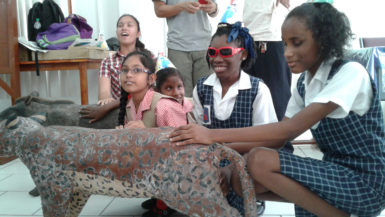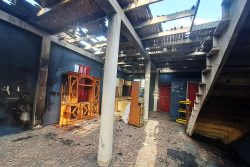Students of the Ministry of Education’s Unit for the visually impaired were last Friday in an interactive session with the Iwokrama International Centre (IIC) as part of its effort to ensure that all Guyanese are informed about its programmes of rainforest and biodiversity conservation and sustainable development.
The IIC in a statement issued on Tuesday said the session featured Dr. Raquel Thomas, tropical forest ecologist and Director of Resource Management and Training at Iwokrama as well as Daisy Payne, a British volunteer with Iwokrama.
Functioning since the 1980s, the visually impaired unit was previously house at the St Rose’s High School in Georgetown, but was subsequently moved to its present Albert Street location in 2014.

At present, the Unit currently provides for the educational needs of 14 visually impaired students, five of whom attend the Unit on a full-time basis while the others attend mainstream schools in the city but take classes at the Unit to reinforce their knowledge in various subject areas.
The Iwokrama team during its interaction with the unit, used life-sized representations of various animals crafted from balata to help the students and teachers understand what the rainforest animals look like; they were also able to familiarize themselves with individual animal sounds with the help of recordings played for them by Payne.
Meanwhile, June Herod, the Head of the Unit, extended gratitude to Iwokrama for recognising the need to help the students appreciate the animals of the rainforest.
She said that the teachers at the Unit use various methods, including designing raised diagrams, so that children at least have a 2D vision of various lessons.
“We do teach them about animals, but this experience, I can tell you, was very different. They were able to get a first-hand experience by being able to feel the animals in 3D. You could have seen the excitement in their expressions,” said Herod.
Currently, the unit is staffed with eight teachers, who though not trained in special education are said to have been using their initiative, their creativity and whatever resources they have to teach the curriculum.
Rosemarie Ramitt, a full-time teacher at the Unit also thanked the IIC for the session, saying, “Some of these children were born blind and this experience of feeling these animals created a whole new image in their mind. Can you imagine what it would be like if I describe an animal to you but you have no idea of what it looks like unless you get to touch it? This has definitely increased the imagination of our students.”
“Honestly I didn’t know anything about Iwokrama until a few weeks ago when I met Raquel. I once had sight and so I know what certain animals look like, but I realised we are not conscious of the fact that those of us born blind have no sense of the world unless we experience it by touch or other means,” she added.






